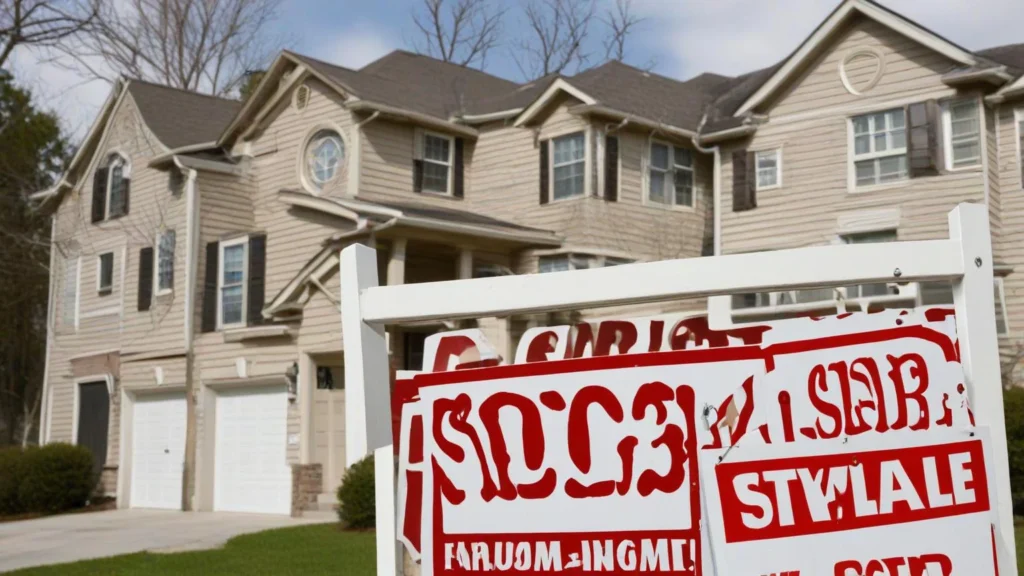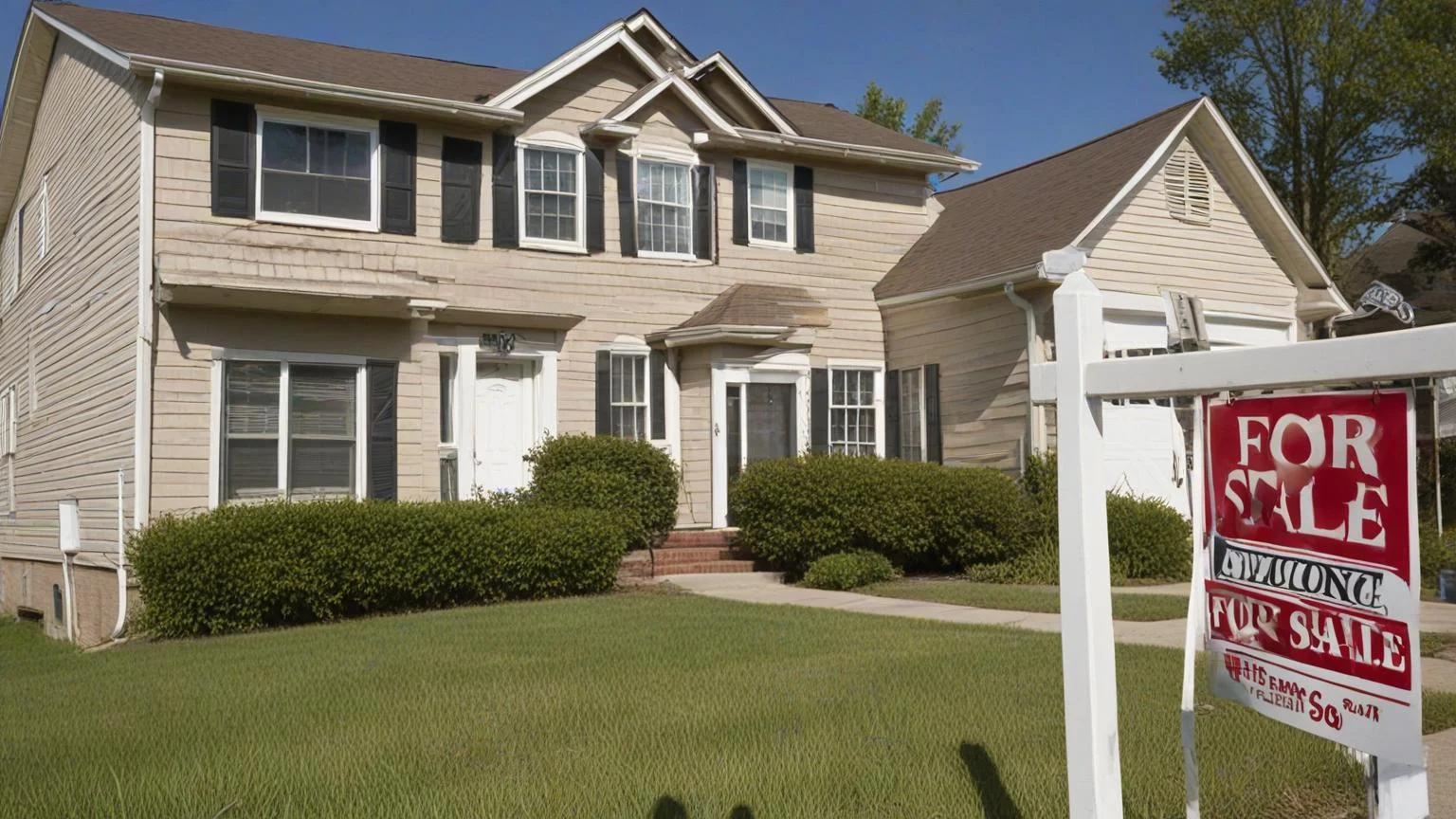Investing in real estate through foreclosures and short sales can offer unique opportunities for savvy investors. These distressed property sales present the chance to acquire properties at potentially below-market prices. However, they also come with inherent risks that investors must carefully navigate. This article explores the opportunities and risks associated with foreclosure and short sale investing, addressing key questions that arise in these transactions.
What Are Foreclosures and Short Sales?

Understanding the nuances of foreclosures and short sales is crucial for anyone interested in real estate investing. These two processes, while related, have distinct characteristics, implications, and opportunities for investors. Let’s delve deeper into each concept to clarify their definitions, processes, and the opportunities they present.
Foreclosures
A foreclosure occurs when a homeowner fails to make mortgage payments, leading the lender to take legal action to recover the outstanding loan amount by selling the property. This process is designed to protect the lender’s interest in the property and is usually a last resort after all other attempts to collect the debt have failed.
The Foreclosure Process
- Missed Payments: The process begins when the homeowner misses several mortgage payments, typically three to six months. The lender will send notices of delinquency and foreclosure warnings.
- Pre-Foreclosure: Before the foreclosure is finalized, the property often enters a pre-foreclosure stage. During this period, the homeowner may have the opportunity to sell the property through a short sale or refinance the loan to avoid foreclosure.
- Foreclosure Auction: If the homeowner fails to rectify the situation, the property moves to a foreclosure auction. This auction is usually public, and the property is sold to the highest bidder, often at a price below market value.
- Bank-Owned Property (REO): If the property does not sell at the auction, it becomes a bank-owned property, also known as Real Estate Owned (REO). The bank then takes ownership and lists the property for sale through real estate agents or online platforms.
Opportunities in Foreclosures
- Discounted Prices: Foreclosed properties are often sold at prices significantly lower than market value, providing a potential for high returns on investment.
- Negotiation Leverage: Investors can often negotiate better terms with banks, especially if the property has been on the market for a while.
- Diversification: Investing in foreclosures allows investors to diversify their portfolios with properties that may require renovation but offer substantial value appreciation potential.
Risks of Foreclosures
- Property Condition: Foreclosed properties are typically sold as-is, meaning they may require extensive repairs and renovations, which can increase the overall investment cost.
- Title Issues: There may be unresolved liens, back taxes, or other legal issues associated with the property, complicating the title transfer process.
- Market Conditions: The value of foreclosed properties can be heavily influenced by market conditions, economic downturns, and neighborhood dynamics.
Short Sales
A short sale occurs when a homeowner sells their property for less than the outstanding mortgage balance with the lender’s approval. This process is typically initiated to avoid foreclosure, allowing the homeowner to avoid the negative consequences of a foreclosure on their credit report.
The Short Sale Process
- Financial Hardship: The homeowner experiences financial difficulties, such as job loss, medical bills, or other significant expenses, making it challenging to keep up with mortgage payments.
- Negotiation with Lender: The homeowner contacts the lender to discuss the possibility of a short sale. The lender will require documentation of the homeowner’s financial situation, including income, expenses, and a hardship letter explaining the reason for the financial distress.
- Listing the Property: Once the lender agrees to the short sale, the homeowner lists the property with a real estate agent. The property is typically marketed at a price that reflects its current market value.
- Approval and Sale: The lender reviews offers from potential buyers and approves the sale. The lender may negotiate the sale price and terms before finalizing the transaction. Once approved, the property is sold, and the lender absorbs the loss between the sale price and the outstanding mortgage balance.
Opportunities in Short Sales
- Negotiable Purchase Price: Buyers have the opportunity to negotiate the purchase price with the lender, potentially securing a property at a lower cost than market value.
- Less Competition: Short sales often attract fewer buyers compared to foreclosures, providing a less competitive market for investors.
- Potential for Equity: If the property is in a desirable location or has significant value potential, investors can acquire it at a discount, enhancing their investment returns.
Risks of Short Sales
- Lengthy Process: Short sales can be time-consuming, with the approval process sometimes taking several months. This delay can be frustrating for investors looking for quick returns.
- Lender Approval: The sale is contingent on the lender’s approval, which is not guaranteed. Lenders may reject the short sale or delay the process, leaving the buyer in limbo.
- Property Condition: Similar to foreclosures, short sales properties may also require repairs and updates, impacting the overall investment costs.
Opportunities in Foreclosure and Short Sale Investing

Potential for Below-Market Prices
One of the primary attractions of investing in foreclosures and short sales is the potential to purchase properties at prices below their market value. Distressed properties may be priced lower due to the urgency of the sale or the condition of the property.
Diverse Investment Options
Investors can diversify their real estate portfolios by including distressed properties. These properties may include single-family homes, condominiums, commercial properties, and even land, depending on the local market conditions.
High Return on Investment (ROI) Potential
Successful foreclosure and short sale investments can yield significant returns. Properties purchased below market value have the potential for appreciation over time, especially in recovering markets or areas with increasing demand.
Negotiation Opportunities
Investors may have the opportunity to negotiate favorable terms with lenders in short sale transactions. This can include purchase price, repair credits, or even financing options, depending on the lender’s motivation to avoid foreclosure.
Risks Involved in Foreclosure and Short Sale Investing
Lengthy and Complex Processes
Both foreclosure auctions and short sales involve complex legal and procedural requirements. Foreclosure auctions are often fast-paced and require cash or financing pre-approval, while short sales can involve lengthy negotiation processes with multiple parties.
Property Condition Issues
Distressed properties may require extensive repairs or renovations, potentially adding to the overall cost of the investment. It’s crucial for investors to conduct thorough inspections and assessments to understand the property’s condition before purchase.
Uncertain atility
Investing in distressed properties can be influenced by market volatility and economic conditions. Changes in local market conditions or broader economic downturns can affect property values and rental demand, impacting investment returns.
Addressing Common Questions
What are the Risks of Buying a Short Sale House?
Buying a short sale house involves risks such as lengthy approval processes, potential for rejection by the lender, and unexpected repair costs. Investors should be prepared for delays and uncertainties inherent in short sale transactions.
Why Do Banks Prefer Foreclosure to Short Sale?
Banks may prefer foreclosure over short sale due to the potential to recover more of the outstanding debt through auction sales. Foreclosure proceedings also offer a clearer path to property ownership for banks compared to the negotiation complexities of short sales.
Is a Short Sale More Profitable than a Foreclosure?
The profitability of short sales versus foreclosures depends on various factors, including purchase price, repair costs, market conditions, and holding periods. Short sales may offer greater negotiation flexibility and potentially lower acquisition costs, but they also come with higher transactional complexities.
Who Benefits from a Short Sale?
Short sales benefit homeowners facing financial hardship by avoiding foreclosure and potential credit damage. Lenders benefit by minimizing losses compared to the costlier foreclosure process. Investors benefit from potential below-market purchases and value appreciation.
Conclusion
Investing in foreclosures and short sales can be rewarding for investors who understand the opportunities and risks involved. While these transactions can offer properties at attractive prices, they require diligent research, negotiation skills, and a thorough understanding of local market dynamics. By carefully assessing each investment opportunity and mitigating risks, investors can capitalize on the potential profitability of distressed property investments.

